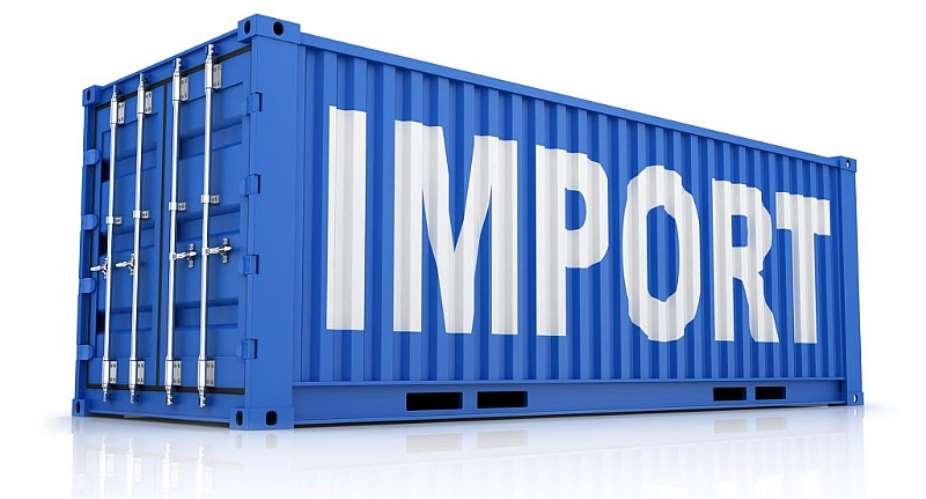The staples of international trades for Ghana and any other nation are the imports and exports. These may seem like terms that have little bearing on everyday life for the average person, but they can, in fact, exert a profound influence on both the consumer and the economy. In the case of Ghana , economists and policy makers from generations after generations have demonstrated their worry about the excessive consumption nature of imported goods in Ghana and yet still we have failed to enact and /or enforced policies to promote and consume more made in Ghana goods. The rhetoric gesture of promoting Made In Ghana (MIG) goods must give way to proper thought through policies or law. Policies that are informed by research.
In today’s global economy, consumers are used to seeing products and produce from every corner of the world in their local malls and stores. These overseas products (imports) provide more choices to consumers and help them manage strained household budgets. But too many imports coming into a country in relation to exports can distort a nation’s balance of trades and devalue its currency. The value of a currency, in turn, is one of the biggest determinants of a nation’s economic performance.

A survey of Made in Ghana goods sold in Ghana’s leading supermarkets has shown that only 18% of goods in 23 product categories surveyed are locally produced. The survey (conducted between April and May 2019) covered eight (8) leading supermarkets in Accra: Shoprite (Accra Mall), Game (Accra Mall), Palace Supermarket (Palace Mall), Koala (Osu), Maxmart (37), CityDia (La), Melcom (North Kaneshie) and Marina Mall Supermarket (Airport). The survey focused on twenty-three (23) main product categories chosen based on a preliminary baseline survey that identified product areas in the supermarkets with MIG goods on display.

The research by international advisory firm Konfidants, is the first in a series of Africa-wide surveys to monitor local content in big supermarkets across the continent.
THE FINDINGS: According to Konfidants, the findings from the research confirm a common observation: There are not enough Made-In-Ghana goods in the stores. A total number of 7462 brands (from the 23 product categories) were counted across all 8 supermarkets included in the survey. Out of this number, 6, 108 (82%) were foreign brands, with only 1354 (18%) being MIG brands.
The findings however reveal interesting insights into how MIG goods perform across the 23 categories. The best performing category of MIG goods is Eggs (with 91% of all eggs on sale produced in Ghana), followed by Bottled water (with 56% MIG). The worst performing categories are jointly Rice and Cosmetics/beauty products with 6% each of products sold in this category being MIG. Other poor performers are Confectionaries & biscuits, Beverage powder & Tea and Sanitary Products – categories which all recorded less than 10% MIG across the supermarkets.

THE RECOMMENDATIONS According to Konfidants , Setting targets for increasing MIG in the supermarkets is important because globally, there is a fierce battle for scarce supermarket shelf-space by manufacturers and suppliers who sometimes pay controversial “slotting fees” in order to have their brands displayed. Increasing the share of MIG goods in supermarkets in Ghana is therefore not bound to happen even if local producers were competitive. There are larger global supply chain forces at work that can sometimes make it inflexible for supermarkets to commit more shelf space for local produce even when they genuinely wish to.
Ultimately local producers will need targeted support from government, regulators like the Ghana Standards Authority and the Food and Drugs Authority; as well as help from the supermarkets (and banks) to support local producers to continuously improve their competitiveness (in quality, standards, pricing and packaging) as well as capacity to bulk supply with consistency and meet steep supplier credit and wholesale pricing expectations of the supermarkets.
GOVERNMENT SHOULD GO BEYOND THE RHETORIC: Yes, the generation of today must demand proper long term initiatives or actions that have......
Continue Reading Here: https://justiceoffeijr.wordpress.com/2019/12/19/82-goods-sold-in-ghana-are-imported/





 2024 election will be decided on the grounds of the economy; choice of running m...
2024 election will be decided on the grounds of the economy; choice of running m...
 Dumsor: We're demanding less; just give us a timetable — Kwesi Pratt to ECG
Dumsor: We're demanding less; just give us a timetable — Kwesi Pratt to ECG
 Do I have to apologise for doing my security work, I won’t – Simon Osei-Mensah r...
Do I have to apologise for doing my security work, I won’t – Simon Osei-Mensah r...
 Prestea and Bogoso mines: Complete payment of outstanding salaries not later tha...
Prestea and Bogoso mines: Complete payment of outstanding salaries not later tha...
 NDC postpones Prof. Opoku-Agyemang entry tour to May
NDC postpones Prof. Opoku-Agyemang entry tour to May
 All my businesses have collapsed under Akufo-Addo — NDC Central regional chair
All my businesses have collapsed under Akufo-Addo — NDC Central regional chair
 Military, Prison Officers clash in Bawku, three injured
Military, Prison Officers clash in Bawku, three injured
 GRA-SML contract: MFWA files RTI request demanding KPMG report
GRA-SML contract: MFWA files RTI request demanding KPMG report
 Court threatens to call second accused to testify if NDC's Ofosu Ampofo fails to...
Court threatens to call second accused to testify if NDC's Ofosu Ampofo fails to...
 Family accuses hospital of medical negligence, extortion in death of 17-year-old...
Family accuses hospital of medical negligence, extortion in death of 17-year-old...
